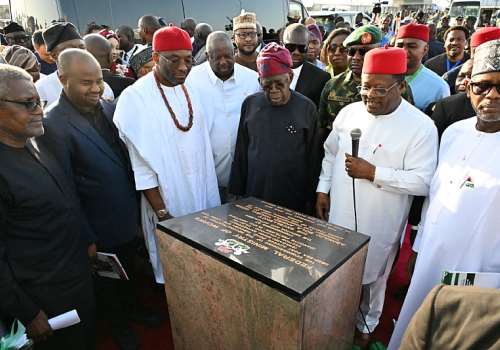President Bola Ahmed Tinubu on Thursday inaugurated the newly reconstructed Lekki-Epe Deep Seaport road in Lagos State, commending stakeholders for their contributions and reiterating his administration’s focus on delivering transformative infrastructure projects across the country.
At the event, Tinubu praised the Minister of Works, David Umahi, and the Chairman of Dangote Group, Aliko Dangote, for their efforts on the project, but he also used the platform to address public criticisms of the ambitious Lagos-Calabar Coastal Highway, a multibillion-naira project that has attracted both praise and opposition.
Speaking firmly, Tinubu urged Umahi to ignore the critics and focus on completing the highway. “Don’t listen to those critics,” he said. “They don’t know what they are talking about. If they don’t like the road or it’s too expensive to toll for them, they will go to a demon’s hide. My role is to affirm our commitment as an administration to deliver engineering infrastructure across the country.”
The President stressed that infrastructure remains the backbone of industrialization, job creation, and long-term economic development, noting that projects like the Coastal Highway and other federal road initiatives form the cornerstone of Nigeria’s economic recovery plan.
He revealed that over 10km of the 55km stretch of Section 2 of the Lagos-Calabar Coastal Highway is already completed and highlighted progress in other sections, including works in Cross River State and along the high-pipeline corridor.
In addition, Tinubu announced plans for new major corridors such as the Trans-Saharan Trade Route, which will connect Calabar to Abuja through Ebonyi, Benue, Kogi, and Nasarawa. He also mentioned accelerated plans for the Akure-Jos-Bauchi-Gombe Corridor, which he described as a legacy project.
The President formally commissioned several road and transport projects, including:
The Sokoto-Badagry Superhighway, with over 370km of new roads in Sokoto and Kebbi States
Section 2 of the Lagos-Calabar Coastal Highway
Full rehabilitation of the Zaria-Kano Road (Sections 1–3)
Reconstruction of the Ipua-Gaboru-Gala Road in Borno State
Completion of the Kano-Maiduguri Road dualisation
The Maiduguri Ring Road (108km)
The Kano Southern Bypass (74km)
The Seventh Axis Road (35km, six lanes) at Lekki Deep Sea Port
Rehabilitation of Lokoja-Benin Road, Sections 2 and 4
Dualisation of the Yoruguma Trail Road in Oyo State
Kano-Daura-Kongoma Road project under the MoA Tax Credit Scheme
Bama-Banki Road reconstruction in Borno, funded by Dangote Group
Tinubu also directed the Minister of Works to coordinate with the Surveyor-General of the Federation and state governors to streamline land and planning approvals, warning against illegal developments along infrastructure corridors.
“We are very serious about this. No more planning approvals for inappropriate islands being created illegally,” he said, calling for unified collaboration between federal and state governments.
Aliko Dangote, who spoke at the inauguration, lauded Tinubu’s vision, stating that the current industrial success of the Lekki Free Trade Zone, including the Dangote Refinery, can be traced to Tinubu’s time as Governor of Lagos State.
“Your Excellency, today you are witnessing the tangible fruits of that vision,” Dangote said. “What you have seen today is nothing. We have just started.”
He particularly praised the naira-for-crude policy, saying it helped Dangote Petroleum Refinery reduce the cost of fuel products like petrol, diesel, LPG, and jet fuel, helping stabilize Nigeria’s currency and reduce import dependency.
Dangote noted, “People think petrol under N900 is high, but there’s no West African country where petrol is below $1 — that’s over N1,600. Your naira-for-crude policy has made our product pricing more stable and competitive.”
He further commended the recently launched Nigeria First Policy, which prioritizes local content and investment, aligning with the Dangote Group’s philosophy of producing what Nigerians consume.
Minister Umahi also shared updates on future infrastructure, revealing that plans are underway for a subsea tunnel to be integrated into the Lagos-Calabar Coastal Highway, a project he described as technologically forward and strategic.
As Tinubu’s administration rolls out road and infrastructure projects across Nigeria, the President’s remarks underscored a clear resolve to keep building—regardless of public scepticism or political opposition.
